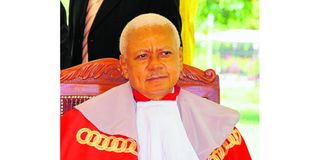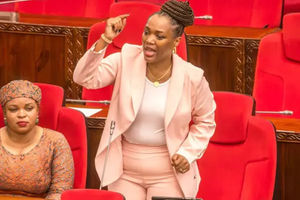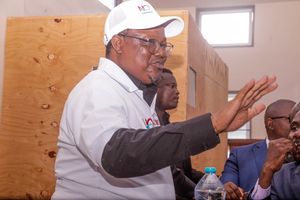Chande: No credible justice delivery system, no growth

Former Chief Justice of Tanzania Mohamed Chande Othman poses during a past event. In an interview with Mwananchi Communications Limited, the former CJ shares deep insights into the justice delivery systems in EA and Sadc. PHOTO | FILE
What you need to know:
- Former Chief Justice (CJ) Mohamed Chande Othman of Tanzania says he Judiciary is a service provider and so when dispensing justice, it is not supposed to forget this aspect of service provision
Former Chief Justice (CJ) Mohamed Chande Othman held an exclusive interview with Mwananchi Communications Limited (MCL) journalists and shared his insights into the 2022 Kenyan presidential petitions and his role as the chairman of the Presidential commission tasked with assessing the performance of the Police Force and other criminal justice organs and advise the government on key reforms. Below are the excerpts as compiled by LOUIS KOLUMBIA
Q: President Samia Suluhu Hassan recently appointed you to lead a 12-member Commission to assess the performance of the Police Force and advise accordingly on reforms. What are the key areas of reforms the Commission will focus on?
A: I first thank the President for forming the Commission aimed at improving efficiency and performance of justice delivery organs.
These reforms will eliminate people’s lack of trust in the organs that are in turn extended to the government.
The job is expected to start immediately to revisit the performance of the Police Force and its collaborative organs that include the office of the Director of Public Prosecutions (DPP), the Solicitor General and the Judiciary.
However, we are not going to make reforms for the sake of just reforming the Force, rather we will have to look at the structure of the law enforcement organ, systems of investigations, training, etc.
But the most important part of institutional reforms is the mind-set of executives in the area of the Judiciary including the judges, magistrates, registrars and other staff.
The Judiciary is a service provider and so when dispensing justice, it is not supposed to forget this aspect of service provision.
Therefore, the Commission will come with recommendations after listening to members of the Police Force as well as other stakeholders in the justice dispensation chain including women associations.
This is something that the President has paid emphasis on after demonstrating demand for Police reform, therefore our job will be to give recommendations after we have listened and contemplated every aspect.
We will also look at other areas and come up with actionable recommendations because the Police Force belongs to the citizens, therefore it is supposed to provide better services on time and avoid finger pointing among institutions.
This is because all the institutions are stakeholders in the justice provision chain starting from investigation, protection of people and properties and cooperation with other institutions.
But, it doesn’t mean that everything done by the Police Force isn’t good, there are some things that are wrong and other good things too.
For instance, there are some cases whose investigations are accelerated, but others take a snail’s pace, what is it that causes the slow pace? Is it because of the systems, operations, skills, technology, etc?
In the past, when someone lost a personal valuable, he/she was supposed to report the loss at a police station, but nowadays, losses can be reported online. The question is whether these advancements can be extended in other areas?
Honourable President has huge expectations of reforming the justice dispensing institutions because there is no development without provision of justice.
Investment will not come in in the absence of justice, therefore reforms will focus at improving the systems of justice dispensing after understanding the problems.
Therefore, we will dig deeper in the systems of recruitment, training, infrastructure, operations, management etc.
Q: What are the lessons that Tanzania and African countries can draw from the just ended Kenyan election if they are to organise credible, transparent and fair elections?
A: An election like the one held in Kenya where 14 million people participated cannot be 100 percent perfect.
There were some irregularities and surprises, but they were not to the extent of discrediting the election.
For example, the Independent Electoral and Boundaries Commission (IEBC) postponed the election of governors in Kakamega and Mombasa, but what is the reason behind the postponement?
They postponed because the ballot boxes were found to have mixed images of the candidates which is the question of due diligence. They did not perform required due diligence.
They have wrongly mixed ballot papers in the boxes, but the explanation they gave is that they could not open the boxes before because they were sealed.
Also read on: ‘Time Tanzania borrowed a leaf from Kenya’s elections’
They had gone to Greece to procure the equipment, so the court said yaah… you bungled up, but it was postponed according to election laws, it was impossible, impracticable to organize elections in those constituencies because of the mix up of ballot papers.
I think electoral commissions in Africa, Tanzania and East Africa should make sure that the right ballot papers are printed and there is some due diligence in the production of ballot papers.
You cannot afford to make mistakes because the other side argued that you know this resulted in voter suppression.
Under the Kenyan election, you have to cast six votes including for the presidency and here you are casting may be five or four votes not for the other candidates.
The live transmission was interrupted and results for 27 constituencies which were not declared publicly because there was a fracas at the national tallying centre.
The reasons they gave is that they had tallied and verified, but they couldn’t announce results because of the fracas as security didn’t allow the announcement.
So, those are the kind of discrepancies that occurred. Also, some scrutiny forms for 12 polling stations were supposed to be used by agents; 34A of Book A, not of Book B because all parties agreed that Book B shouldn’t be used and it should remain sealed.
But there were some forms of Form 34A of Book II, six of the 30 or so polling stations used from Form 34A of Book II and they said we did not know, we were remote, we did not know, we did not have Book One, so we used Book II.
And when Book One was traced it was intact, so they mistook the exact book that had to be used, which is irregular.
When an election involves as many people as 14 million or so, it is very important for electoral commissions to be diligent, thorough, prepared, have skilled employees, systems that can immediately correct defects even that do not have an impact on the election.
Q: The constitution of Kenya establishes the Supreme Court of Kenya which mainly hears petition relating to presidential election and appeals from the Court of Appeal. Do you think Tanzania need to have that court?
A: Well. I think during the Judge Warioba (retired Judge Joseph Warioba) Constitution Review Commission (CRC) and the Constitution Assembly (CA) the Judiciary of Tanzania proposed the establishment of the Supreme Court in the country.
There was neither significant debate nor disagreement on that issue because it is something that will add value to our justice systems.
By having the Supreme Court in Tanzania, we weighed the advantages and disadvantages; whether it will expand or narrow the access to justice because it was going to become the sixth judicial level.
However, it was essentially considered to deal with questions of law and constitutional interpretations, not the questions of facts that could be decided by lower courts: the Primary Courts, District Courts, Regional Magistrate Courts, High Court and off course the Court of Appeal.
If there are conflicting decisions made by the Court of Appeal, the Supreme Court can make decisions because if you have the Court of Appeal that issues conflicting decisions, they can be corrected by the Supreme Court.
This is not at any extra cost, because judges are there, it is also the question of law and promulgating the rules of procedures for the Supreme Court.
There is enough experience for Africa to learn from the Supreme Court in Uganda which has been there for many years, the Supreme Court of Kenya, South Africa, etc.
I think countries in the Sadc (Southern African Development Community) region that have Courts of Appeal as the apex court are like Botswana, Lesotho, Swaziland and Namibia.
But, in Namibia, they call it the Supreme Court of Appeal, but in reality it is the Court of Appeal, but countries with exact Supreme Courts are Kenya and Uganda.
But, issues of controversy need to be addressed including the age at which judges should retire because under the country’s constitution it is 60 years.
But, while the High Court judges retire at 60, the Court of Appeal judges are supposed to retire at 65.
But, under the Proposed Constitution, the proposed retiring age is 65 for every judge, because there is no reason for High Court judges to retire at 60, while Court of Appeal counterparts retire at 65.
There was no controversy on the issue, but you can see, we don’t have a new constitution and Tanzania laws have changed allowing senior lecturers to retire at 65 years. If the senior lecturer at the university can retire at 65, why not a High Court Judge? But, changes of judges’ retirement age need to be done in the constitution: amended constitution or the new constitution.
So, there are issues that were debated and found their way in the Proposed Constitution, I think we will join Kenya, Uganda and Rwanda in a list of Sadc countries with supreme courts.




